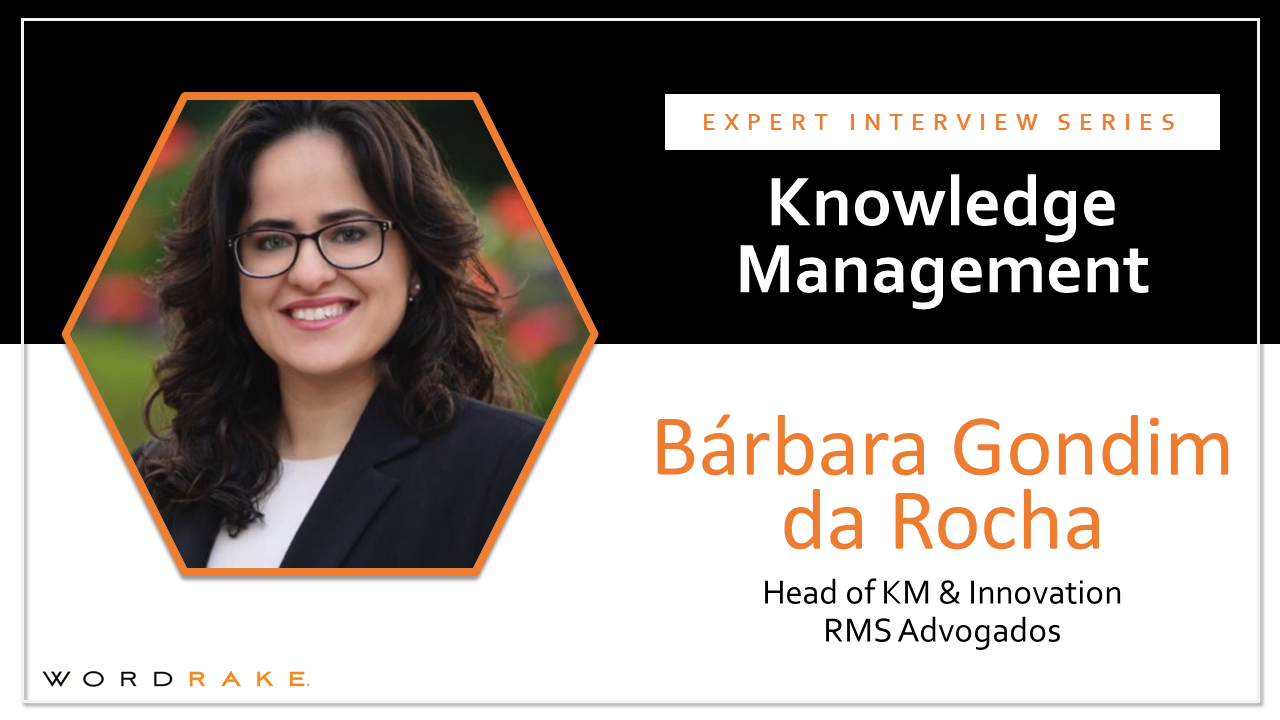Are there moments at work that make you think, “There has to be a better way to do this”? Everyone has had this thought at some point, but it takes significant time and coordination with coworkers and experts to investigate these workplace inefficiencies which slow everyone down. There may be pushback against changing existing systems from “the way it’s always been,” but making the investment in knowledge management systems can have substantial payoff beyond relieving your pet peeves. In this interview with lawyer and knowledge management expert Bárbara Gondim da Rocha, learn how knowledge management can develop solutions that keep your company profitable and keep clients satisfied, even with a competitive market and added difficulties of remote work in the pandemic.
What is your role and where does it fit in your organization?
I began my career at RMS Advogados as an intern back in 2005, while I was still in law school. Once I graduated and passed the bar exam, I was hired as an associate attorney. After about 10 years handling civil litigation cases, as I started working closely with the managing partners, I gradually transitioned to a more strategic role, even though my job title remained the same.
It was only a couple of years ago that I learned about knowledge management and the significance of a strong knowledge management system to support innovation at a law firm. Now I lead a cross-disciplinary team of professionals (lawyers, data analysts, business process analysts, project managers, records clerks, legal assistants, and more) who help lawyers understand and implement processes and technology for the benefit of the firm and its clients.
What prompted your interest in knowledge management?
I’ve been in the legal field for over 20 years and, until very recently, I thought being a practicing attorney was the only possible career that existed for someone who, like me, graduated from law school and worked in a law firm.
But a few years ago I saw some inefficiencies at my firm and I decided to talk to one of the partners about it. As I shared my concerns about the lack of standardization of processes; the difficulty of finding documents stored in our servers; and the lack of awareness of many tools available in the firm, she invited me to work on a solution.
As a result, we created new roles at the firm and I became what I call “an incubator” to them. My main responsibility was to keep these professionals on track and find ways to make us more efficient. We started with a couple of business process analysts, who would speak to the attorneys about their day-to-day activities in order to document the current state of the processes and elicit their pain points.
That was before I found out the field of knowledge management even existed. When I did, I was able to connect to other professionals with similar backgrounds and bring more value to this new role I was transitioning into.
How do you define knowledge management?
To define knowledge management, I usually use Patrick DiDomenico’s words and call it a discipline that enables “getting the right information to the right people at the right time.” In fact, the first time I heard the term knowledge management was in 2017, when Patrick spoke at a conference in Sao Paulo, Brazil. He mentioned that there were many possible definitions of knowledge management, but he reckoned that communicating to lawyers the goal of KM was much more important.
How can knowledge management improve document creation?
Knowledge and information are two of the most important assets a law firm has. If you add to that the fact that a huge part of this knowledge is captured in the documents generated daily by lawyers and legal professionals, you can quickly understand why legal knowledge management was first adopted with a focus on documents. The initial target was to identify and index existing work product as well as create precedents and templates.
Lawyers have historically generated documents by taking an existing document, copying it, and making changes. Unless the firm has developed knowledge management initiatives, finding a similar document to use as a model takes time and can lead to copy-and-paste mistakes.
In this regard, knowledge management can make the document creation process more efficient, allowing lawyers to focus on higher value work. But moving from the copy-and-paste structure to generating documents in an easier and less time-consuming way requires time and dedicated resources.
How can a person without a JD contribute to a firm’s knowledge management success?
One of the reasons I transitioned to knowledge management was because, as a practicing attorney, I started to visit clients and figured out that simply being good at practicing law doesn't necessarily make clients happy. Many clients are dealing with business problems that would be better solved if looked at from different perspectives, other than the law itself.
In a recent ILTA podcast entitled “Separating True Innovation from Hype,” Greg Lambert was spot on when he said that “not everything that needs improvement requires a lawyer to do it.”
Having business professionals work alongside lawyers is critical to understanding the client’s actual pain points and the solutions available based on the firm's resources.
It is also through contributions from professionals with different backgrounds that law firms can provide greater transparency and metrics around clients’ demands.
What tangible value can firms gain from knowledge management?
Over the past decade, the corporate legal market in Brazil experienced a major change due to the expansion and restructuring of corporate legal departments. As in-house teams became more sophisticated themselves, they demanded similar qualities from the outside firms.
Clients also began to dictate the cost structure of legal work performed by outside counsel, so most of this work is performed at a flat fee rather than by the hour. They monitor costs and key performance indicators that legal service providers must report on to ensure that a high standard of quality is delivered.
As Brazilian corporate law firms face the challenge of meeting clients’ demands, the reality is they must do “more with less,” so they can’t just hire more lawyers. Thus, rather than being “nice to have,” knowledge management turns out to be critical for law firms to remain competitive and to build a strong client base.
Being profitable while delivering high quality services for the price clients will pay is a tangible value firms gain from KM, at least here in Brazil.
How can knowledge management help with remote work?
Back when people were working at the office, anyone could easily walk down the hall and ask for the information or guidance to do a specific task or find a specific person. Office workers could rely on knowledge that wasn’t written down.
With remote work being the norm and with lawyers having to work on their own, without being surrounded by colleagues and business service support, lawyers need to learn how to find answers on their own, especially because clients need answers fast.
Now more than ever, firms must rely on knowledge management tools, repositories, and services to not only find the right information (WHAT) or connect to the right people (WHO), but also to make sure clients are being served the right way (HOW).
What are examples of challenges you encounter in doing your work?
Brazil has more law schools than the rest of the world combined, over a million lawyers, and a justice system that costs over 20 billion dollars a year. The nation is also highly litigious, with over 80 million active ongoing lawsuits.
But bureaucracy and traditional mindsets remain a key issue in Brazil. Court proceedings are arranged by each state’s judiciary, with court structure varying across the 27 states. The lack of a standard structure creates obstacles for developing more sophisticated technologies, because it has a much higher cost.
There’s also internal resistance from some practitioners about the use of technology, because they fear it will steal their jobs.
So I would say that bureaucracy, non-standard court procedures, and lawyers' innate resistance to change is the “starter pack” of challenges that I face in my job, especially considering that my firm handles over 250,000 claims distributed throughout every judicial district of the country.
About Bárbara Gondim da Rocha, LL.B., MBA
Bárbara Gondim da Rocha is a lawyer and the Head of Knowledge Management and Innovation at RMS Advogados, one of the largest law firms based in the northeast of Brazil. She began working there as in intern in 2005 and has been there ever since. Before her current role, Bárbara spent over 10 years handling cases in civil litigation, specializing in appeals to the highest courts in Brazil. Her interest in technology and process improvement led her to join the field of knowledge management and set up a KM system at her firm.
Bárbara is a regular speaker, blogger, and author on the topics of knowledge management, innovation, leadership, and technology adoption. She was recognized as one of the 2020 Young Professionals to Watch at ILTA's 2020 Distinguished Peer Awards. She is also a recipient of ILTA's 2021 Volunteer Awards.
About the Knowledge Management Interview Series
This interview is part of a collection of interviews about knowledge management work. Lawyers are the original knowledge workers and knowledge is a key asset in the legal field. By producing this series, we hope to show how document creation fits with innovation and knowledge management goals.
Documents are highly valued for their outcomes, but undervalued as knowledge assets. Create better, more meaningful documents with WordRake. WordRake is clear and concise editing software designed for people who work with confidential information. The software improves writing by simplifying and clarifying text, cutting legalese, and recommending plain English replacements. WordRake runs in Microsoft Word and Outlook, and its suggestions appear in the familiar track-changes style. Learn about our 2-week enterprise pilot or try an individual license of WordRake for free for 7 days.






